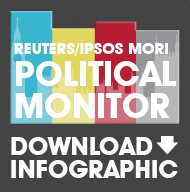Reuters/Ipsos Political Monitor January 2012
First Reuters/Ipsos Political Monitor of 2012 shows Conservative and Labour neck and neck, but Ed Miliband’s ratings are his worst ever.
Most Britons think the UK will still exist in its current form in five years time, but half think it will not in 20 years. Three-quarters say Scottish independence would have no impact on their personal finances, but more think it would be harmful to the Scottish economy than the rest of the UK.
Voting intention: CON 38 (-3); LAB 38 (-1); LIB DEM 12 (+1)
 The January 2012 Reuters/Ipsos Political Monitor shows Ed Miliband’s personal ratings have fallen to their lowest level since becoming Labour leader. Thirty percent are satisfied with his performance, down four points from December, while 56% are dissatisfied. His ratings have also fallen among Labour supporters, to 46% satisfied and 44% dissatisfied.
The January 2012 Reuters/Ipsos Political Monitor shows Ed Miliband’s personal ratings have fallen to their lowest level since becoming Labour leader. Thirty percent are satisfied with his performance, down four points from December, while 56% are dissatisfied. His ratings have also fallen among Labour supporters, to 46% satisfied and 44% dissatisfied.
His party, meanwhile, is level-pegging with the Conservatives, both on 38% support, with the Liberal Democrats on 12%. The Conservatives are down three points since December, suggesting they may have lost some of the boost since the eurozone veto, but David Cameron’s personal ratings continue to rise to his highest since 2010, with 46% satisfied with his performance. Nick Clegg’s ratings remain unchanged.
Economic optimism has recovered somewhat since the bad news at the end of 2011. The Economic Optimism Index (those who say they economy will get better over the next 12 months minus those who think it will get worse) has risen from -48% in December to -35 now. However, half (51%) are still pessimistic about the country’s economic prospects.
As the debate over Scotland’s independence intensifies, although most Britons (62%) think the UK will still exist in its current form in five years, half (49%) think it won’t in 20 years. Britons are unconvinced that Scottish independence would lead to a major boost to either Scotland’s economy or to the rest of the UK. Three-quarters (73%) say it would make no difference to their personal finances, while on balance they feel it would have a negative impact on Scotland’s economy (54%, versus 22% positive), but many fewer feel it would make a difference to the rest of the UK (34% negative impact, 16% positive impact, 42% make no difference).
There is a three-way split on the impact independence would have on Scotland’s standing in the world: 23% say it would improve, 35% get worse, and 36% make no difference. Meanwhile, half (53%) think it would make no difference to the standing of the rest of the UK; a third (35%) say it would have a negative impact.
On questions of process and procedure, there is no clear consensus. Although half (48%) think the referendum should include a question on ‘devolution-max’, 42% think it should be restricted to a question on independence only. And 48% think the UK Parliament in Westminster should have the final say over the timing and question wording, but 44% feel it should lie with the Scottish Parliament. Conservative voters are much more likely than Labour or Liberal Democrats to think that Westminster should have the final say, and that only independence should be included in the referendum.
Gideon Skinner, Head of Political Research at Ipsos said
“Although the Conservatives and Labour are tied, their leaders are moving in opposite directions. Ed Milband’s ratings are his worst since becoming Labour leader, while David Cameron’s are his highest since the end of 2010. Meanwhile, in the long-term only a third of Britons think they will not see a break-up of the United Kingdom – but their scepticism over the impact Scottish independence would have on the economy strikes a cautionary note.”
Ipsos interviewed a representative sample of 1,007 adults aged 18+ across Great Britain. Interviews were conducted by telephone 21-23 January 2012. Data are weighted to match the profile of the population.



